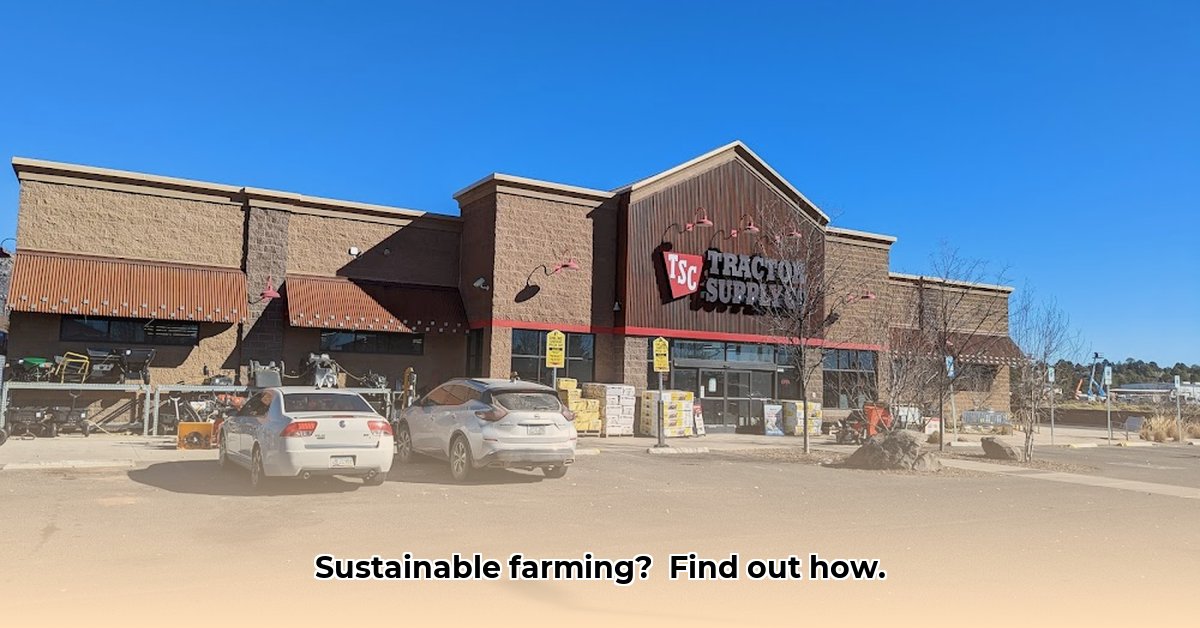
Imagine the arid beauty of the Flagstaff landscape, a patchwork of high-desert farms and ambitious home gardens clinging to life amid the thin, crisp air. A familiar sight punctuates this scene: the Tractor Supply store on Route 66, a seemingly ordinary retail outlet. But could this everyday hardware store be a key player in shaping Flagstaff's agricultural future, fostering a more sustainable approach to food production? This article explores that very question, examining the potential—and limitations—of Tractor Supply's contribution to environmentally conscious farming in the region. For more on Tractor Supply's impact on sustainable farming, see this helpful resource.
Tractor Supply's Flagstaff Footprint: A Community Hub
Located at 2020 East Route 66, Flagstaff's Tractor Supply serves as a vital resource for the community. Farmers, ranchers, and home gardeners alike rely on its extensive inventory—from heavy-duty equipment to small gardening tools—for their agricultural needs. While the store professes a commitment to serving rural communities, the extent of its contribution to sustainable practices remains largely unquantified. This lack of concrete data forms a central challenge in evaluating its role. How do its offerings directly support environmentally friendly practices? This article seeks to address this crucial question.
The Promise (and the Challenge) of Sustainable Agriculture
Picture a Tractor Supply brimming with organic seeds, water-efficient irrigation systems, and compost bins. This vision represents the potential for a significant contribution to sustainable agriculture in Flagstaff. The availability of such products would directly support local efforts to minimize environmental impact and promote environmentally friendly farming practices. However, a lack of verifiable data prevents a definitive assessment of how close the current reality reflects this ideal. A crucial gap in knowledge persists regarding the sustainability of Tractor Supply's supply chains and the environmental footprint of its operations.
The Need for Transparency: Data Gaps and Future Research
Currently, evaluating Tractor Supply’s impact on sustainable farming in Flagstaff is hampered by a shortage of data. Quantifiable information on sourcing practices, product certifications (like organic labels), and the store's overall environmental footprint remains elusive. Without access to these crucial metrics, a truly comprehensive assessment is impossible. This lack of transparency isn't a condemnation, but rather a call for greater accountability and a recognition of the need for robust data collection. The potential for positive change exists, but reliable evidence is necessary to substantiate such claims.
Actionable Steps Towards a Greener Future
Bridging the gap between potential and reality requires collaborative effort from various stakeholders. The following steps are critical:
Comprehensive Inventory Assessment: A thorough analysis of the store's inventory is crucial, focusing on the percentage of sustainably sourced or certified organic products – from seeds and fertilizers to tools and equipment. This data is essential to establishing a baseline for future improvements.
Community Engagement: Surveys and focus groups with local farmers and gardeners can reveal their needs and priorities concerning sustainable agriculture. This feedback will directly inform Tractor Supply’s product selection and stocking strategies.
Staff Training and Empowerment: Investing in employee training on sustainable agricultural practices enhances their ability to advise customers and promote eco-friendly choices. This builds a culture of sustainability within the store itself.
Municipal Collaboration: Collaboration with the Flagstaff City Council can integrate Tractor Supply’s efforts into broader municipal sustainability initiatives, potentially unlocking new avenues for support and incentive programs.
Conclusion: Building a Sustainable Partnership
Flagstaff Tractor Supply possesses substantial potential to contribute positively to sustainable agriculture in the region. Realizing this potential hinges on a commitment to transparency, robust data collection, and collaborative action amongst consumers, the store, local farmers, and the city council. By working together, we can foster a healthier, more sustainable food system for Flagstaff's unique agricultural landscape. Continued research and open communication are vital to achieving this shared goal.